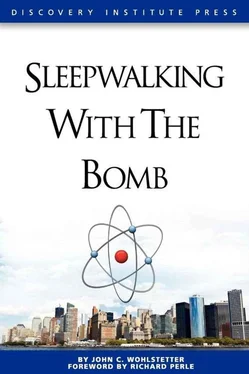John Wohlstetter - Sleepwalking with the Bomb
Здесь есть возможность читать онлайн «John Wohlstetter - Sleepwalking with the Bomb» весь текст электронной книги совершенно бесплатно (целиком полную версию без сокращений). В некоторых случаях можно слушать аудио, скачать через торрент в формате fb2 и присутствует краткое содержание. Город: Seattle, Год выпуска: 2012, ISBN: 2012, Издательство: Discovery Institute Press, Жанр: История, military, Политика, Публицистика, на английском языке. Описание произведения, (предисловие) а так же отзывы посетителей доступны на портале библиотеки ЛибКат.
- Название:Sleepwalking with the Bomb
- Автор:
- Издательство:Discovery Institute Press
- Жанр:
- Год:2012
- Город:Seattle
- ISBN:978-1-93659-906-6
- Рейтинг книги:3 / 5. Голосов: 1
-
Избранное:Добавить в избранное
- Отзывы:
-
Ваша оценка:
- 60
- 1
- 2
- 3
- 4
- 5
Sleepwalking with the Bomb: краткое содержание, описание и аннотация
Предлагаем к чтению аннотацию, описание, краткое содержание или предисловие (зависит от того, что написал сам автор книги «Sleepwalking with the Bomb»). Если вы не нашли необходимую информацию о книге — напишите в комментариях, мы постараемся отыскать её.
RICHARD PERLE, Resident Fellow, American Enterprise Institute and Assistant Secretary of Defense, 1981–1987 Sleepwalking with the Bomb
Sleepwalking with the Bomb — читать онлайн бесплатно полную книгу (весь текст) целиком
Ниже представлен текст книги, разбитый по страницам. Система сохранения места последней прочитанной страницы, позволяет с удобством читать онлайн бесплатно книгу «Sleepwalking with the Bomb», без необходимости каждый раз заново искать на чём Вы остановились. Поставьте закладку, и сможете в любой момент перейти на страницу, на которой закончили чтение.
Интервал:
Закладка:
China’s Half Millennium of Self-Isolation
TO SEE the roots of such a regional conflict one must begin with Chinese history, and the Chinese interpretation of it, which emphasized the harmful impact of its intercourse with the U.S. and other Western powers over the choices made by its own dictatorial rulers.
From the early nineteenth century to the beginning of the twentieth, the European powers heaped serial humiliations upon China. The Opium Wars of the mid-nineteenth century led to Britain’s thuggish imposition of the degrading, enervating opium trade on the Chinese. The colonial powers pushed around the decaying Manchu Dynasty rulers at will. The crowning episode of this dolorous history was the Boxer Rebellion. Starting in 1898, the “Society of Fists of Righteous Harmony”—“Boxers” armed with guns, martial arts, and ecstatic spirit-possession—aimed to eject foreign powers and secure China’s release from imperial domination and exploitation. Allied with the Manchu empress Cixi, they laid siege to the foreign embassies in Beijing for 55 days in 1900. The Eight-Nation Alliance of Japan, Russia, Britain, France, America, Germany, Austria, and Italy crushed the uprising, offering the Manchu Dynasty a settlement in 1901 in which the Chinese paid heavy indemnities to the foreign powers, particularly Russia and Germany.
All this came as the United States was beginning to flex its muscles in the Pacific. U.S. Commodore Matthew Perry’s 1853 visit to Tokyo Bay ended Japan’s 250-year isolation and opened trade between the U.S. and the Far East. After the U.S. Navy defeated the Spanish Navy at Manila Bay (looking out at the South China Sea), Secretary of State John Hay’s 1899 Open Door Policy pressed for wider trade with China, thus increasing pressure on the decaying Manchu Dynasty to open up to all sources of Western trade.
Without in any way down playing the harm caused China by foreign powers, however, internal decisions and events were of immense consequence in retarding the global fortunes of China, arguably of greater impact than external pressures. In 1434 the Ming emperor (why remains unclear) suddenly halted the series of seven massive seagoing explorations begun in 1401, which had taken the great Admiral Zheng He as far as Africa, and dismantled the Chinese fleet. China’s fleet featured ships far larger than the tiny vessels in which Christopher Columbus sailed at the end of the century, and superior in many aspects of design and construction. The “treasure ships” of the fleet were purportedly 450 feet long and 180 feet wide—half the length of a World War II aircraft carrier. Unlike the voyages of European explorers, mounted in search of trade and treasure, China’s voyages, historian Daniel Boorstin explains, were simply to show the rest of the world how advanced and refined China’s civilization was.
Just 26 years after China destroyed its awesome fleet, Prince Henry the Navigator launched the first of Europe’s great explorations that eventually would take Christopher Columbus to the New World (in 1492) and Vasco de Gama to India (in 1498). As China began to retreat into its shell—sporadically banning private shipping and coastal settlement—the West began its 500-year rise to global supremacy.
The “Middle Kingdom” disdained “barbarians” from its perch at the center of the earth—China had a gross domestic product in 1820 that was, at 30 percent of world GDP, larger than that of the U.S. and Europe combined. (Chinese GDP was to be the world’s largest for 18 of the last 20 centuries.) But its feeble military position gave it few levers in the face of foreign aggression. A China that had stayed among the leaders in military power and influence would have been in a far stronger position to resist the incursions that began a full four centuries after the dismantling of its world’s-best fleet.
The next huge event impoverishing China came in the mid-nineteenth century: the 1850–1864 Tai Ping Rebellion, in which ethnic Chinese revolted against the Manchus who had ruled China since 1644. With the aid of the French and British imperial powers, the Manchu overlords prevailed over the Tai Ping rebels, but at a tremendous cost. The crushing of the rebellion, combined with other mid-nineteenth-century turmoil, resulted in a staggering 15 percent decline in China’s population between 1850 and 1873, from 410 to 350 million. (Ironically, Tai Ping means “Great Peace.”) By comparison, the American Civil War—which ran four years—killed 2 percent of America’s population of 30 million, a slightly lower annual percentage loss, but for one-quarter the time span. To recall the impact of the Civil War on American politics to this day suggests the long-term devastation the ethnic enmities of the Tai Ping Rebellion have caused.
In the twentieth century, China suffered several other signal catastrophes—two internal, and one from its neighbor—each of which, alone, would have derailed any normal nation’s progress. First was Japan’s 1937 attack against a China riven by civil strife. The subsequent eight years’ war was marked by extreme Japanese brutality, including the infamous Rape of Nanking that killed some 300,000 people in six weeks, and the use of outlawed chemical and bacteriological weapons. Estimates place China’s casualties at 35 million, with 20 million dead and 15 million wounded. Even in a country with over 500 million people, the toll astonishes.
The second and third mega-events both came to China courtesy of one man: the self-styled “Great Helmsman,” Mao Zedong, who marched into Beijing on October 1, 1949, bringing doctrinaire Marxist economics with him. In 1958 he began the grand agricultural collectivization experiment called the “Great Leap Forward.” It lasted just shy of three years and claimed—through famine, oppression, and suicide—as many as 40 million lives. In a country with about 650 million in 1960, the Great Leap thus killed one of every 16 Chinese. For America today the equivalent figure would be over 20 million deaths. Compared to this stupefying mass murder due to ideological fervor, the 2 to 2.5 million toll from two Chinese civil wars (1928–1937 and 1946–1950) is almost lost in the shuffle.
Add the four percent death toll of the Sino-Japanese War to the six percent death toll of the Great Leap Forward, and China lost roughly ten percent of its population in the two catastrophes. Now throw in the third mega-catastrophe, Mao’s 1966–1969 Cultural Revolution. In an effort to impose socialist norms, Mao purged academics, sent urban populations en masse to remote rural areas, and interred dissidents in “reeducation” camps. The result was an estimated 1 to 20 million dead.
Over 120 years, the loss of some 150 million lives through the serial carnages of the nineteenth-century conflicts, Sino-Japanese War, Great Leap Forward, and Cultural Revolution—coupled with China’s half millennium retreat from world trade—surely had a vastly greater impact on China’s geopolitical fortunes than the much-trumpeted Western imperial humiliations of the self-weakened country.
Today China has about 1.3 billion people. Its GDP in purchasing power parity (GDP adjusted for relative currency value) is roughly two-thirds that for the U.S., but spread over more than four times as many people. This means that once China’s GDP is adjusted both for purchasing power parity and per capita, it is perhaps one-sixth of America’s. One question lingers: Where would China rank today had it not suffered the series of catastrophes that began in 1434?
China’s Resurgence
CHINA’S FALL began with a retreat from the world, and its resurgence began when it opened to the United States in 1971, ending the American government’s refusal to recognize Mao’s regime. Later that year, the Communist mainland replaced Nationalist China as permanent member of the UN Security Council—and as sole internationally recognized representative of the Chinese people. President Nixon went to China early in 1972.
Читать дальшеИнтервал:
Закладка:
Похожие книги на «Sleepwalking with the Bomb»
Представляем Вашему вниманию похожие книги на «Sleepwalking with the Bomb» списком для выбора. Мы отобрали схожую по названию и смыслу литературу в надежде предоставить читателям больше вариантов отыскать новые, интересные, ещё непрочитанные произведения.
Обсуждение, отзывы о книге «Sleepwalking with the Bomb» и просто собственные мнения читателей. Оставьте ваши комментарии, напишите, что Вы думаете о произведении, его смысле или главных героях. Укажите что конкретно понравилось, а что нет, и почему Вы так считаете.












